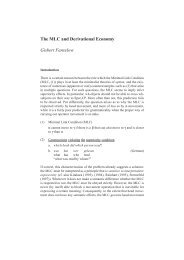Differential subject marking in Polish: The case of Genitive vs ...
Differential subject marking in Polish: The case of Genitive vs ...
Differential subject marking in Polish: The case of Genitive vs ...
You also want an ePaper? Increase the reach of your titles
YUMPU automatically turns print PDFs into web optimized ePapers that Google loves.
NP-related function is illustrated <strong>in</strong> (1) below (Kiparsky 1998:268). An <strong>in</strong>tr<strong>in</strong>sically telic<br />
(bounded) verb such as saan ‘get’ takes a Partitive marked object when the object is<br />
quantitatively <strong>in</strong>determ<strong>in</strong>ate (an <strong>in</strong>def<strong>in</strong>ite bare plural or mass noun), otherwise the object is<br />
marked for ACC(usative). In other words, the Partitive tells us someth<strong>in</strong>g about the specific<br />
<strong>in</strong>terpretation <strong>of</strong> the NP <strong>in</strong> such <strong>case</strong>s. In contrast, with an aspectually unmarked verb (i.e., a verb<br />
arguments, <strong>in</strong>clud<strong>in</strong>g <strong>subject</strong>”, “viewpo<strong>in</strong>t is conveyed by a grammatical morpheme, usually verbal” (Smith<br />
1997:2). <strong>The</strong> first type <strong>of</strong> aspect, i.e., semantic aspect, refers to the atemporal contours <strong>of</strong> an eventuality<br />
(Richardson 2003:24, referr<strong>in</strong>g to Filip 1994), to <strong>in</strong>ternal temporal features <strong>of</strong> situations (Smith 1997:17),<br />
such as whether they are static or durative, whether they are telic (have a natural f<strong>in</strong>al endpo<strong>in</strong>t: a goal,<br />
outcome, or other change <strong>of</strong> state, i.e., are <strong>in</strong> some sense “bounded”) or atelic, whether they are durative or<br />
<strong>in</strong>stantaneous. [Eventuality is a term borrowed from Bach (1981), which is used to refer to any k<strong>in</strong>d <strong>of</strong><br />
situation type.] On the basis <strong>of</strong> the temporal properties <strong>of</strong> dynamism, durativity and telicity, Smith (1997:3,<br />
20) dist<strong>in</strong>guishes five different situation types (see also Comrie 1976:41-51 for discussion):<br />
(i) Situation types (Smith 1997:3)<br />
a. state: stative, durative (know the answer, love mary)<br />
b. activity: dynamic, durative, atelic (laugh, stroll <strong>in</strong> the park)<br />
c. accomplishment: dynamic, durative, telic, consist<strong>in</strong>g <strong>of</strong> process and outcome (build a house, walk to<br />
school, learn Greek)<br />
d. semelfactive: dynamic, atelic, <strong>in</strong>stantaneous (tap, knock)<br />
e. achievement: dynamic, telic, <strong>in</strong>stantaneous (w<strong>in</strong> a race, reach the top)<br />
In contrast, grammatical aspect (‘viewpo<strong>in</strong>t aspect’) focuses on the temporal perspective <strong>of</strong> an eventuality.<br />
Smith (1997:3) dist<strong>in</strong>guishes three ma<strong>in</strong> viewpo<strong>in</strong>t types:<br />
(ii) Viewpo<strong>in</strong>t types:<br />
a. Perfective viewpo<strong>in</strong>ts focus a situation <strong>in</strong> its entirety, <strong>in</strong>clud<strong>in</strong>g both <strong>in</strong>itial and f<strong>in</strong>al endpo<strong>in</strong>t.<br />
b. Imperfective viewpo<strong>in</strong>ts focus part <strong>of</strong> a situation, <strong>in</strong>clud<strong>in</strong>g neither <strong>in</strong>itial or f<strong>in</strong>al endpo<strong>in</strong>ts.<br />
c. Neutral viewpo<strong>in</strong>ts are flexible, <strong>in</strong>clud<strong>in</strong>g the <strong>in</strong>itial endpo<strong>in</strong>t <strong>of</strong> a situation and at least one <strong>in</strong>ternal stage<br />
(where applicable).<br />
Richardson (2003:28), follow<strong>in</strong>g Kle<strong>in</strong> (1994), def<strong>in</strong>es grammatical aspect as the relation between the Topic<br />
Time (a time for which the speaker wishes to make an assertion) and the Situation Time, i.e., “it signals the<br />
way, or ways, <strong>in</strong> which an eventuality is l<strong>in</strong>ked to the Topic Time” (ibid.). If an eventuality is conta<strong>in</strong>ed<br />
with<strong>in</strong> the Topic Time, i.e., it is bounded <strong>in</strong> time, a perfective viewpo<strong>in</strong>t is taken. If an eventuality holds<br />
throughout and potentially extends beyond the Topic Time, i.e., it is unbounded, an imperfective viewpo<strong>in</strong>t is<br />
taken (Richardson 2003:28-29; see also Borik 2002 for a somewhat different formalization <strong>of</strong> the notion <strong>of</strong><br />
viewpo<strong>in</strong>t aspect, her “Reference time aspect”).<br />
<strong>The</strong>se two types <strong>of</strong> aspectual <strong>in</strong>formation, i.e., semantic aspect and grammatical aspect, are <strong>in</strong>dependent,<br />
though they <strong>in</strong>teract with each other (see, among others, Smith 1997, Borik 2002, Richardson 2003 and the<br />
references cited there for discussion <strong>of</strong> this controversial issue). Smith (1997:1) gives the examples <strong>in</strong> (iii) to<br />
demonstrate that the same situation may be presented from different perspectives: (iii-a) has a perfective<br />
viewpo<strong>in</strong>t, whereas (iii-b) has an imperfective viewpo<strong>in</strong>t.<br />
(iii) a. John and Mary built a rock garden last summer.<br />
b. John and Mary were build<strong>in</strong>g a rock garden last summer.<br />
Richardson (2003:25) further po<strong>in</strong>ts out that “imperfective sentences […] can be applied to the same<br />
situations to which a perfective verb applies, i.e., the imperfective aspect can be used to convey the <strong>in</strong>famous<br />
konstatacija fakta ‘statement <strong>of</strong> fact’ <strong>in</strong>terpretation <strong>of</strong> a verb phrase. That is, the imperfective aspect is used<br />
felicitously <strong>in</strong> Russian even when it is understood by the <strong>in</strong>terlocutors that the eventuality was completed;” cf.<br />
(iv).<br />
(iv) a. Ja citala “Vojnu i mir”. b. Ja procitala “Vojnu i mir”.<br />
I readIMPERF war and peace I readPERF war and peace<br />
‘I read “War and Peace”.’ ‘I read “War and Peace”.’<br />
2

















